World Travel
Tools for Possibilities: issue no. 101
Once a week we’ll send out a page from Cool Tools: A Catalog of Possibilities. The tools might be outdated or obsolete, and the links to them may or may not work. We present these vintage recommendations as is because the possibilities they inspire are new. Sign up here to get Tools for Possibilities a week early in your inbox.
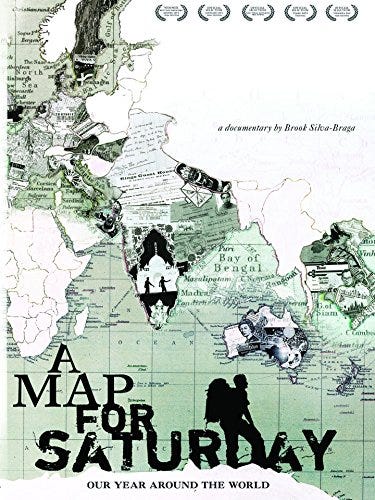
How it feels to vagabond
Don’t watch this documentary unless you are ready to quit your job. It’s about the joys and woes of long-term traveling. It’s impossible to watch this fun film and not confront the fact that you are here instead of there, out on the road, soaking up the mysteries of the world, with all-you-can-eat $3 dinners and $5 rooms, backpacking around the world for a year, as the filmmaker himself did. This kind of vagabonding is more a state of mind than a state of motion. Something weird happens when you travel longer than 10 days, and that wonderful transformation (which no one can explain to their family when they return) is what this superbly written, fabulously edited, deeply personal and wonderfully likeable documentary is all about.
This film explores the mellow subculture of (mostly) young people who trek along an invisible international traveler’s circuit. There’s a kind of endless distributed global party going on every day of the year (plainly visible here), and to join it all you need is a ticket to any country and the address of the local hostel. I was part of this mind-set for many years and boy, does this film nail the peculiar delights of perpetual cheap travel. Not just the highs (everyday is Saturday, each new person an instant best friend), but also the lows (always saying goodbye, and loss of connection).
This DVD won’t give you the how-to specifics of vagabonding. For that I recommend First-Time Around the World. A Map for Saturday works best as an orientation course, offering inspiration on why to tackle this once-in-a-lifetime adventure. It’s the next best thing to having a good friend come back and tell you what really happens when you find yourself at the other end of the road. — KK
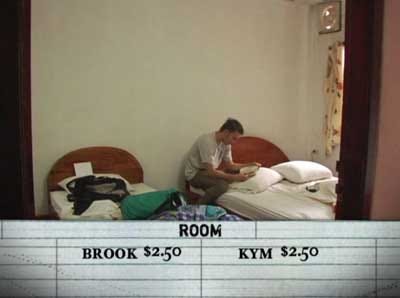

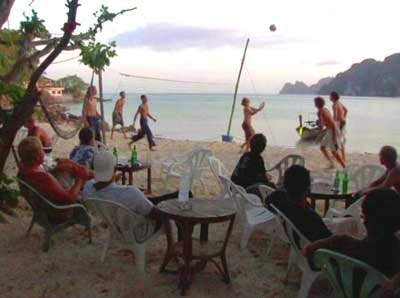
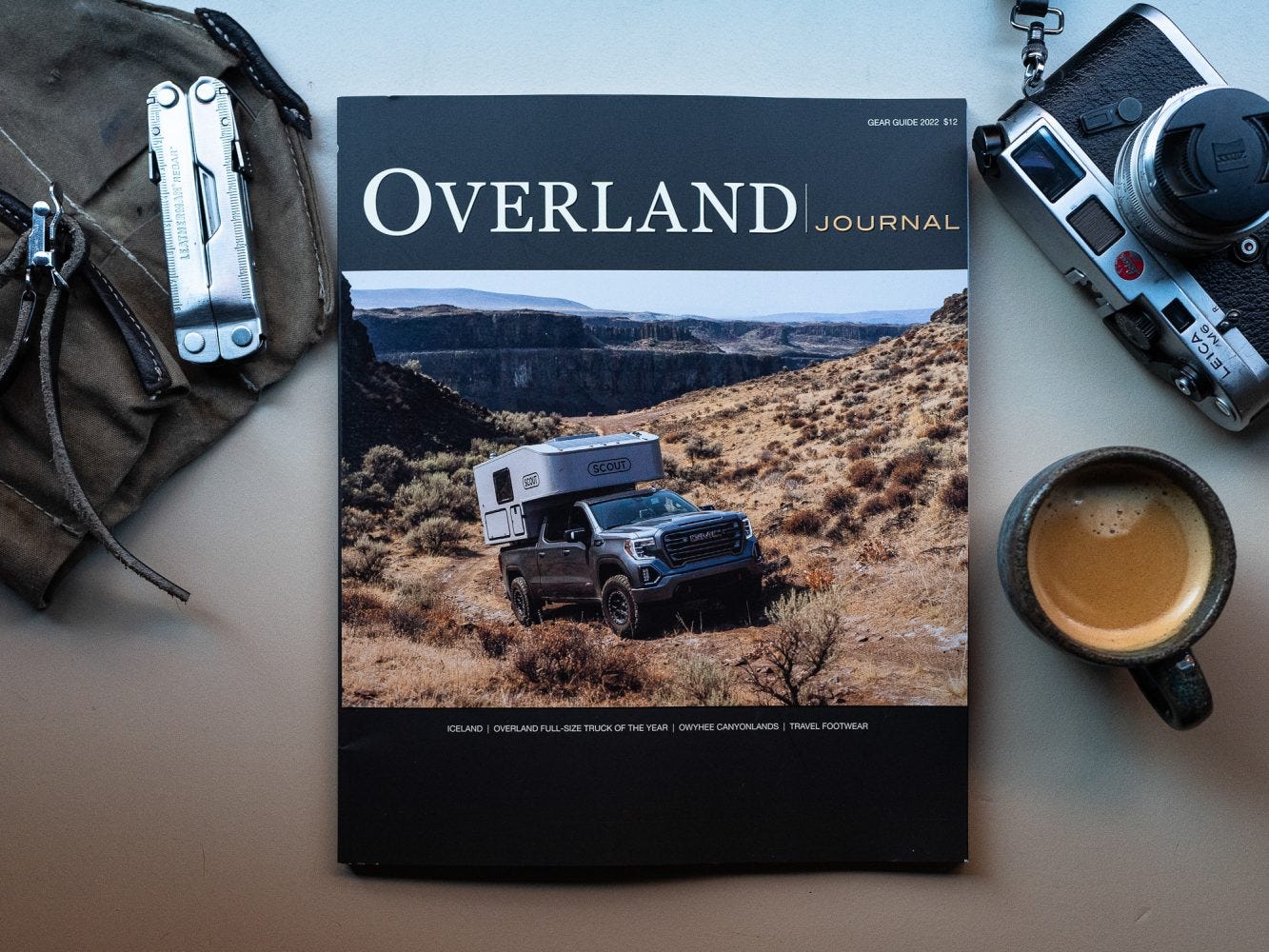
4-wheel adventurers
Last month I helped out a guy stuck on Tioga pass get his vegetable oil powered Gelaendewagen back on the road. He showed me a copy Overland Journal and I was so impressed I subscribed and ordered all the back issues once I got home. To give you an idea of the flavor of the magazine, one of the contributing editors is the author of my previously reviewed Vehicle Dependent Expeditions book.
For anyone who does car camping, 4×4 exploring, vehicle trips abroad, or just enjoys armchair exploration, I cannot recommend this publication enough. It has amazing comprehensive comparison reviews of the type of gear no other publication would cover, ranging from vehicle rooftop tents to converting a LandCruiser to bio-diesel. On top of the fantastic information and writing in the magazine, it is gorgeously designed and features beautiful expedition shots from around the world. It is the first publication I have come across in years that has me reading every word, review and even advertisement. They publish four issues per year, plus a gear guide and back-issues are available to ’97. — Alexander Rose

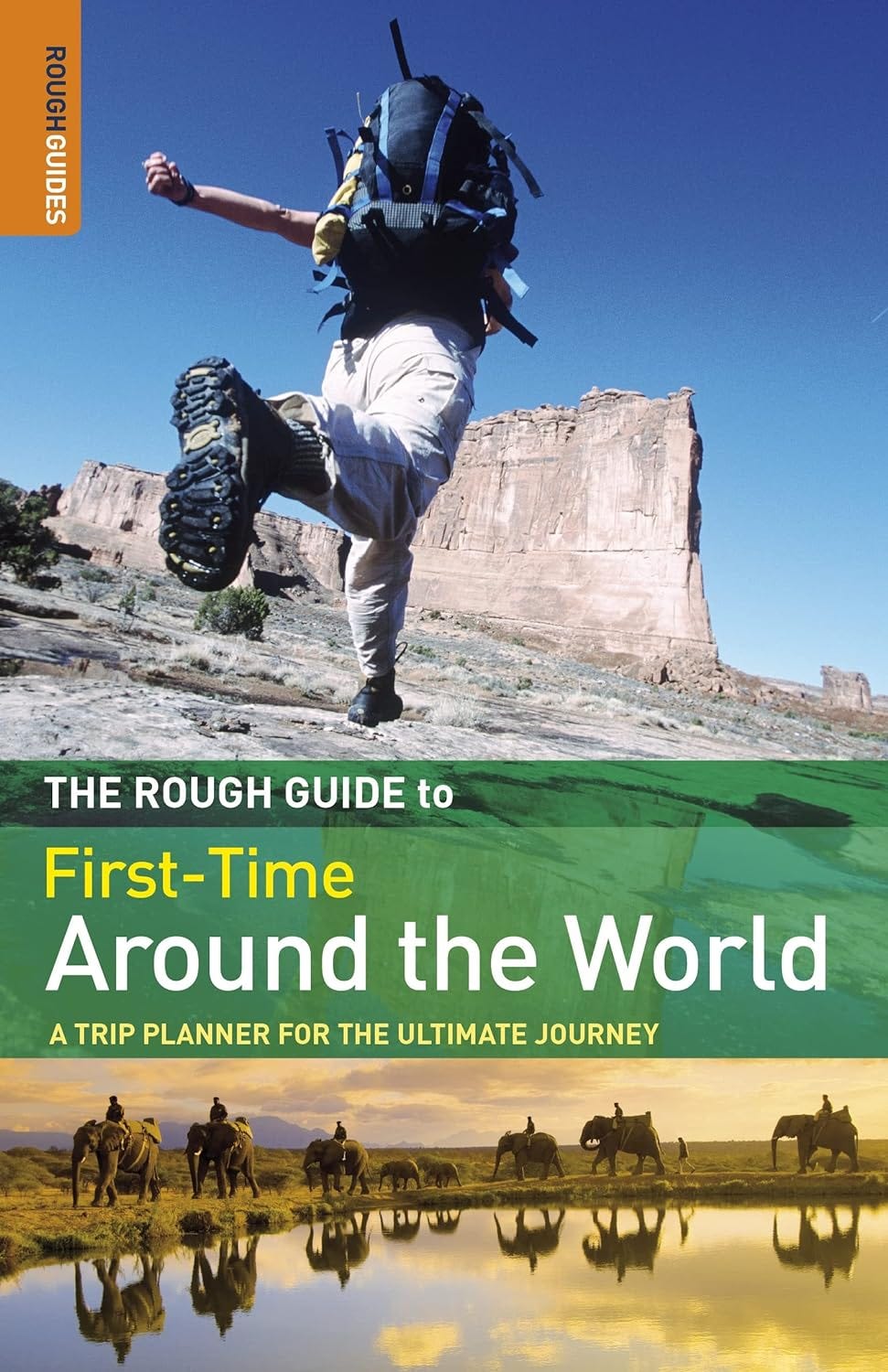
Best guide to the ultimate trip
The ultimate trip is a slow transverse of the globe on very little money with lots of time. I’ve recommended two guides for this way of traveling in the past: The Practical Nomad (for budget travelers) and World Stompers (for those with almost no money). While both of these books still have some good tips in them, they are both a bit out of date and have been superceded by this great new information-packed volume from Rough Guides.
First-Time Around the World is the book I would write if I had to give my advice on how to travel cheaply and globally. It’s smart, current, wise, and true. And worth reading even if you are only traveling for a few weeks. — KK
- Q: I’ve got $4000 saved up. Will that get me around the world?
A: No problem. You can find round-the-world tickets for half that price, or hitchhike on yachts for even less. The more important question is what kind of trip do you want to take and how long do you want it to last? To figure out a daily budget that fits your comfort level, and to learn which countries offer the best value, turn to the “Cost and savings” chapter, where you’ll find some budgeting tips as well. - Fake police scam
A kid comes up and asks for change for a small banknote. Not long after (most likely in a city park or on a quiet road), a man approaches, flashes a badge quickly and tells you he’s a police officer. He explains that the note you just received from the boy was counterfeit and that he needs to take it back to headquarters and you will be fined for your involvement. At this point, just as you are starting to wonder if it’s real, a large muscular “colleague” arrives and pressures you to pay up.
How you beat it: take a good long look at the badge and tell him that, although he is certainly a genuine officer, there are many impersonators and that, according to their own tourist ministry, you’re supposed to make all such spot payments at police headquarters, and you’ll be happy to follow him there on foot. Under no circumstances should you get into their “unmarked police car”. - Free transport scam
You’re met at the train or bus station by a tout who is offering free transport back to his hostel. You follow him onto a city tram and notice that it’s not free – he just didn’t pay the fare.
How you beat it: ask how you’ll be getting to the hotel. If it’s by public transport, make sure the tout is willing to cover your fare. - Time and space
One thing travellers often forget to mentally prepare for is the different conception of time and space on the road. With buses that don’t leave until they’re full, boats that wait at the harbour for the captain to return from his family holiday, and mechanical problems that require spare parts sent by cargo ship from Australia, the hardcore traveller’s mantra of “no watches, no calendars, no worries” begins to seem like a healthy response. Your personal space, on the other hand, is likely to shrink, whether you’re speaking with someone who insists on standing almost nose-to-nose during the conversation or you’re packed into a six-person minivan with seventeen other passengers. Plan for twice as much transport time as you think you need, try to grab a seat near a window so you can control the fresh-air supply – and make sure you’ve got something to read. - Round-the-world tickets
Because of their complexity, round-the-world (RTW) tickets are best booked with a knowledgeable travel agent. London is probably the cheapest place to start such a trip, but that can vary slightly based on route and currency exchange, and it’s unlikely that getting a round-trip ticket there to start your trip will provide any (or significant) savings. - By yacht
Private yachts of all types often need an extra pair of hands during a sea passage. Some are crewed by professional captains delivering a boat to a new owner and some by “old salt” couples who live aboard their vessels full time. They usually follow common routes across seas where anchorages are safe, the scenery is agreeable and (since many are retired) the prices are low – and simply want a little help or a little company on board. In other words, it doesn’t necessarily mean seeing the world with a bunch of nouveau riche assholes. It’s possible to get a working passage or catch a free lift (though people may request $5-25 / £3-14 per day to cover your food and drinks)
Useful yachting websites
Matching skippers and crew
http://www.sailingnow.com
https://www.crewseekers.net
http://www.globalcrewnetwork.com
http://www.crewfile.com
http://www.partnersandcrews.com - Meeting locals
It’s hard to pick up a travel magazine, brochure or guidebook without seeing an exotic cast of faces. The unspoken message seems to be that this is who you’ll meet in these countries. The people you’re far more likely to encounter, however, are other travellers. And the local people you’ll mostly come in contact with are vendors, taxi drivers, guides and hotel clerks – people serving you. To make more genuine contacts takes some effort. Volunteering or working in a place is one of the best ways. But even if you’re just looking to take a picture of someone, a thoughtful approach might lead to a more meaningful connection. - Free accommodation
Travel exchanges are growing in popularity as a Web-based method of finding a bed for free. Once you’ve registered on one of the websites below, you gain access to a list of accommodation offered by other travellers. You email those that sound appealing and, if they say yes, you get to use their sofa, bed, hammock or whatever’s available. It takes a little advance planning and a good deal of Internet surfing and mailing, but the results can be hugely rewarding. The minimal (and fair) hidden cost is that you have to offer your home to travellers heading your way, although you are under no obligation to let them stay. Check out:http://www.globalfreeloaders.com http://www.hospitalityclub.org






